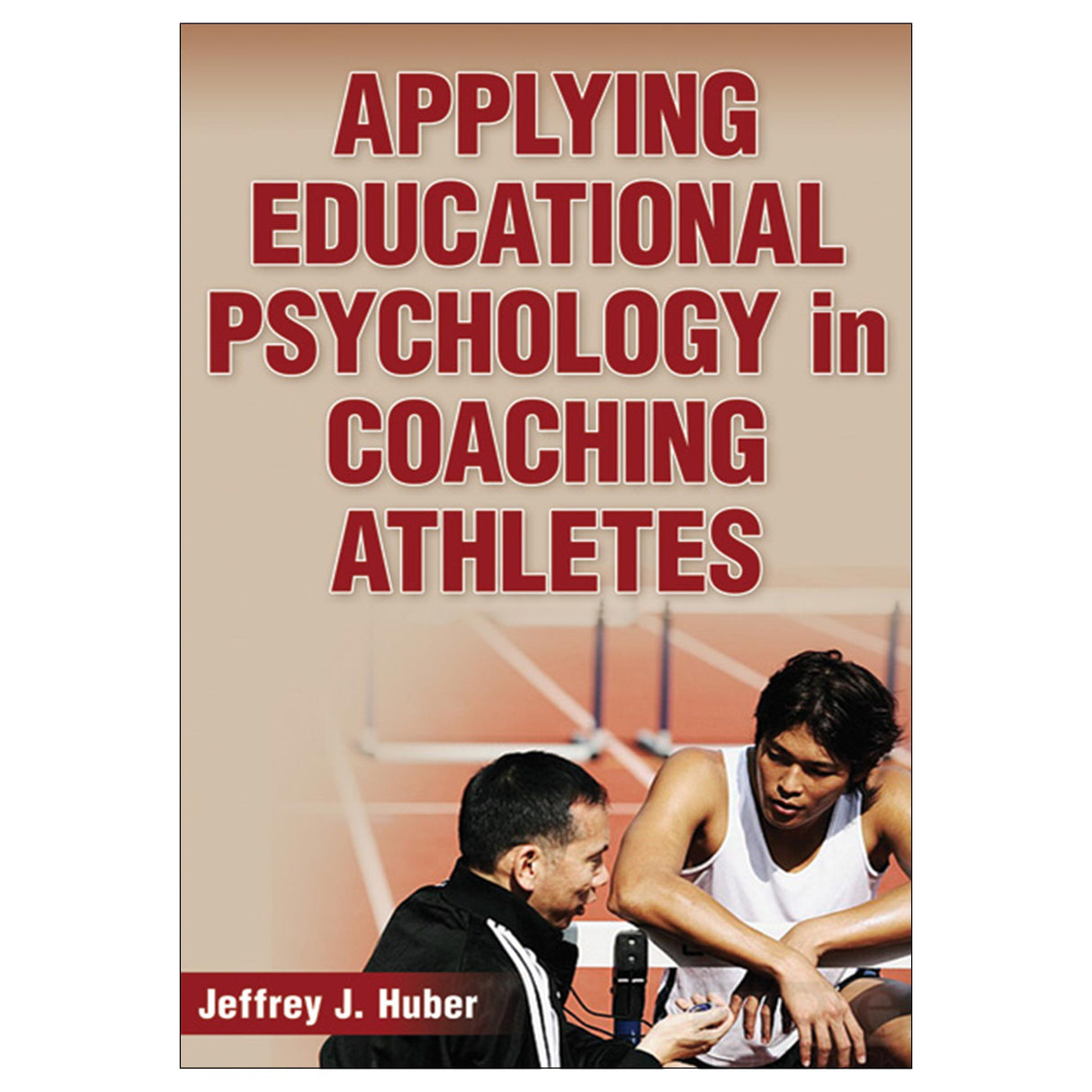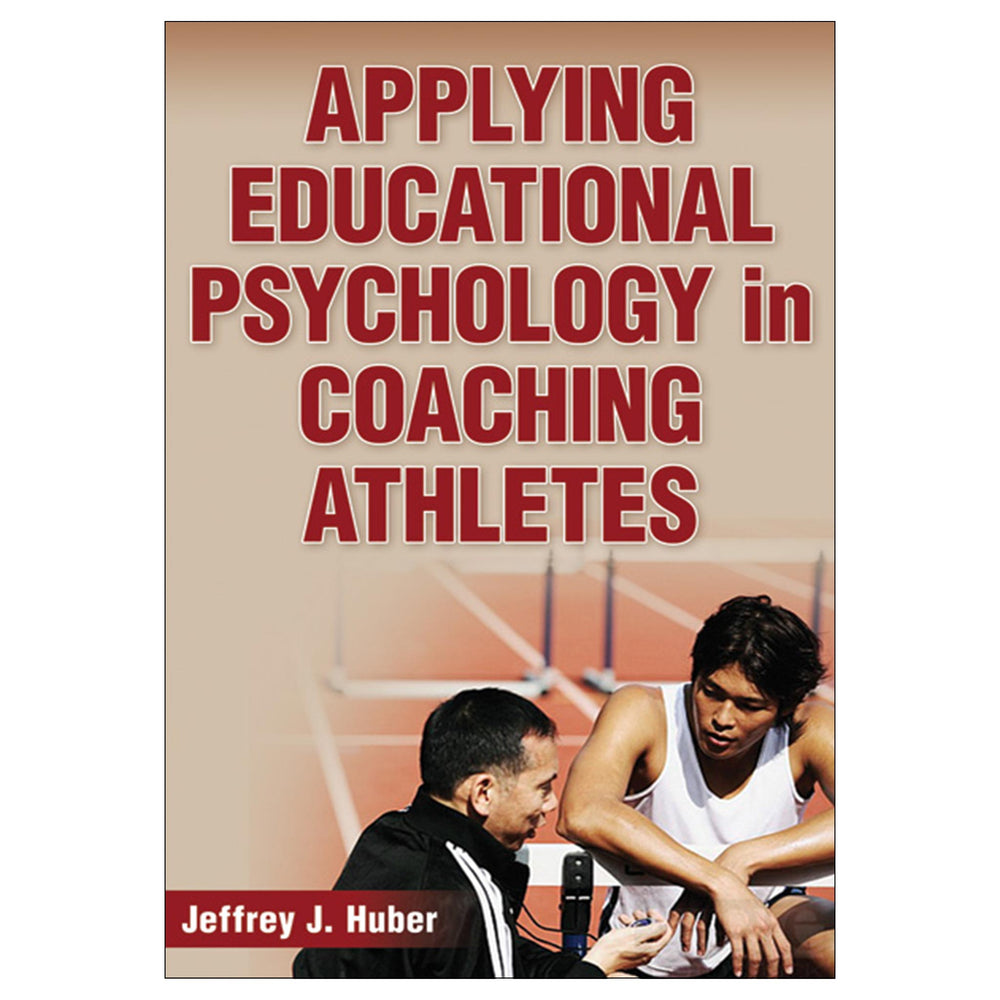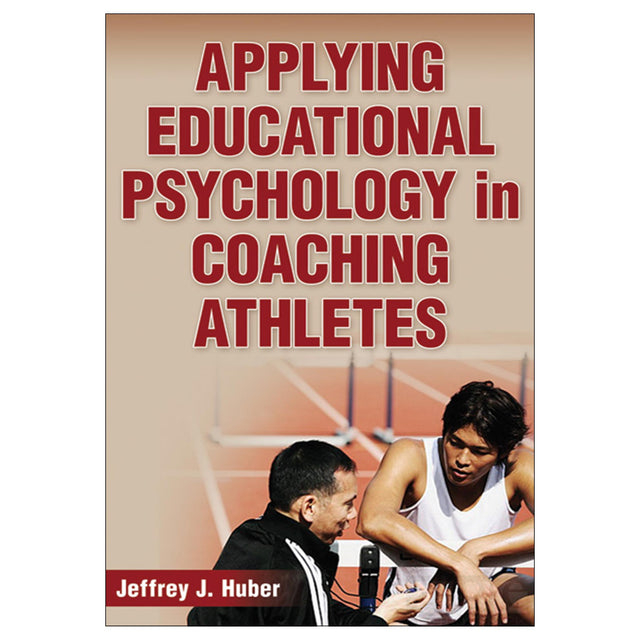Applying Educational Psychology in Coaching Athletes
Author: Jeffrey J. Huber
$114.95 CAD
Applying Educational Psychology in Coaching Athletes discusses how to improve coaching success and athletic performance through the application of teaching principles and theories. Delving deeper than an explanation of what athletes learn and what coaches teach, Applying Educational Psychology in Coaching Athletes offers insight into the how of athletes’ learning and coaching by considering
• principles of psychology that drive the emotions, motivation, expectations, self-worth, and relationships of athletes;
• application of principles of psychology to the motor learning process; and
• use of principles of educational psychology to improve sport expertise and coaching success.
A three-time U.S. Olympic coach and veteran collegiate coach, Huber infuses his own experience in applying theories of educational psychology in working with individual athletes, as well as world-class national and international teams. With an engaging presentation and strong practical applications, Huber assists coaching students and practicing coaches in utilizing educational psychology as a platform for improving coaching skills.
Applying Educational Psychology in Coaching Athletes introduces the idea of the developing coach as both teacher and learner, and how coaching principles and a strong coaching philosophy provide a foundation for effective management and decision-making. By considering the theories that drive successful coaching, developing coaches gain focus, motivation, and guidance as they learn how a thoughtful coach provides the structure and discipline to make athletes more successful on the field of play.
Throughout the text, Huber focuses on how athletes learn, considering theories of motivation, behaviorism, cognition, and humanism, and the interplay between emotions and motor learning and performance. Each chapter opens with a coaching related anecdote that readers can relate to in order to highlight the significance of the theory under consideration. After careful explanation of each theory, Huber details concrete examples, guidelines, and specific applications for coaching. In addition to summary information, each chapter concludes with ‘Your Coaching Toolbox,’ which focuses readers on ways to incorporate their newly gained knowledge into their interactions with athletes.
Applying Educational Psychology in Coaching Athletes is unmatched in its depth of insight into the teaching and learning process in sport and how to put it into practice. By examining how athletes learn and coaches teach, the text helps coaches understand how to maximize athlete performance and increase their athletic success.
Audience
Upper-undergraduate and graduate-level text for courses in coaching, sport psychology, and sport science; supplemental text in courses specific to coaching a single sport; reference for academic libraries as well as high-performance or youth and interscholastic coaches.
Part I. Athletes and Theories of Motivation
Chapter 1. The Unstoppable Athlete: Applying Motivation Theory
Behaviorism and Motivation
Cognitivism and Motivation
Social Cognitive Learning and Motivation
Humanism and Motivation
The Unstoppable Athlete
The Unstoppable Coach
Your Coaching Toolbox
The Scientific and Artful Coach
If You Remember Only Three Things
Suggested Readings
Chapter 2. The Resilient Athlete: Applying Attribution Theory
Attribution Theory
Beliefs about Ability
Perceived Causality and Emotional Response
Attributions, Achievement Motivation, and Self-Worth
Applying Attribution Theory to Increase Athlete Motivation
Self-Determination Theory
The Resilient Athlete
The Resilient Coach
Your Coaching Toolbox
The Scientific and Artful Coach
If You Remember Only Three Things
Suggested Readings
Part II. Athletes and Theories of Behaviorism
Chapter 3. The Salivating Athlete: Applying Respondent Conditioning Theory
Pavlov’s Classical (Respondent) Conditioning
Positive Respondent Conditioning Examples
Applying Respondent Conditioning Theory in Coaching Athletes
Thorndike’s Connectionism Theory
Applying Connectionism Theory in Coaching Athletes
Conclusion
The Salivating Athlete
The Salivating Coach
Your Coaching Toolbox
The Scientific and Artful Coach
If You Remember Only Three Things
Suggested Readings
Chapter 4. The Athlete in the Skinner Box: Applying Operant Conditioning Theory
Skinner’s Operant Conditioning Theory
Types of Reinforcement Schedules
Extrinsic Feedback as Reinforcement
Applying Extrinsic Feedback Using Operant Conditioning in Coaching Athletes
Instrinsic Feedback as Reinforcement
Four Types of Athlete Behavior Worth Conditioning
Applying Operant Conditioning Theory in Coaching Athletes
The Athlete in the Skinner Box
The Coach in the Skinner Box
Your Coaching Toolbox
The Scientific and Artful Coach
If You Remember Only Three Things
Suggested Readings
Part III. Athletes and Theories of Cognitive Learning
Chapter 5. The Imitating Athlete: Applying Social Cognitive Theory
Social Cognitive Theory
Four Processes of Observational Learning
Sources of Reinforcement
Effects of Imitation
Applying Observational Learning Theory to Coaching Athletes
The Imitating Athlete
The Imitating Coach
Your Coaching Toolbox
The Scientific and Artful Coach
If You Remember Only Three Things
Suggested Readings
Chapter 6. The Supercomputing Athlete: Applying Cognitive Learning Theory
The Computer as Metaphor
Three Memory Components: The Basic Information Processing Model
Three Stages of Motor Learning
Three Cognitive Motor Learning Theories
Three Stages of Information Processing for Motor Performance
The Supercomputing Athlete
The Supercomputing Coach
Your Coaching Toolbox
The Scientific and Artful Coach
If You Remember Only Three Things
Suggested Readings
Chapter 7. The Expert Athlete: Applying Expertise Theory and Deliberate Practice
Expertise Theory
Characteristics of Expertise
Characteristics of Deliberate Practice
Engaging in Deliberate Practice: Three Phases of Development
Creating Deliberate Practice
The Expert Athlete
The Expert Coach
Your Coaching Toolbox
The Scientific and Artful Coach
If You Remember Only Three Things
Suggested Readings
Part IV. Athletes and Theories of Humanism
Chapter 8. The Fully Human Athlete: Applying Humanistic Learning Theory
Humanistic Psychology
Applying Four Common Emphases of Humanistic Coaching
Nondirective Model of Coaching
Constructivism
Pyramid of Teaching Success in Sport (PofTSS)
The Fully Human Athlete
The Fully Human Coach
Your Coaching Toolbox
The Scientific and Artful Coach
If You Remember Only Three Things
Suggested Readings
Chapter 9. The Emotional Athlete: Applying Emotion Theory
Emotions and Performance
Arousal, Anxiety, and Performance
Consequences of Emotions
Applying Emotion Theory in Coaching Athletes
The Emotional Athlete
The Emotional Coach
Your Coaching Toolbox
The Scientific and Artful Coach
If You Remember Only Three Things
Suggested Readings
Part V. Developing Your Coaching Skills and Philosophy
Chapter 10. The Principled Coach: Applying Principles of Practice Management and Discipline
Management and Discipline
The Practice Environment
Applying Preventive Strategies in Coaching Athletes: Heading Them Off at the Pass
Applying Corrective Strategies in Coaching Athletes: When It’s Too Late to Head Them Off at the Pass
The Bridled Athlete
The Principled Coach
Your Coaching Toolbox
The Scientific and Artful Coach
If You Remember Only Three Things
Suggested Readings
Chapter 11. The Philosophical Coach: Applying Wisdom
Considerations for Developing a Coaching Philosophy
Developing Ethics Within Your Philosophy
Developing Values Within Your Philosophy
The Values of Sport
The Philosophical Coach
The Wise Coach
Your Coaching Toolbox
The Scientific and Artful Coach
If You Remember Only Three Things
Suggested Readings
"I highly recommend Dr. Huber's book for anyone who wants to reach their potential as a sports coach. The book is required reading for my graduate students who regularly tell me it is the best coaching book they have ever read. I also constantly recommend the book to high school and college coaches. The book is special because it is a rare, and detailed, blend of applied science and actual coaching practice."
- Wade Gilbert, PhD, Professor California State University, Fresno





